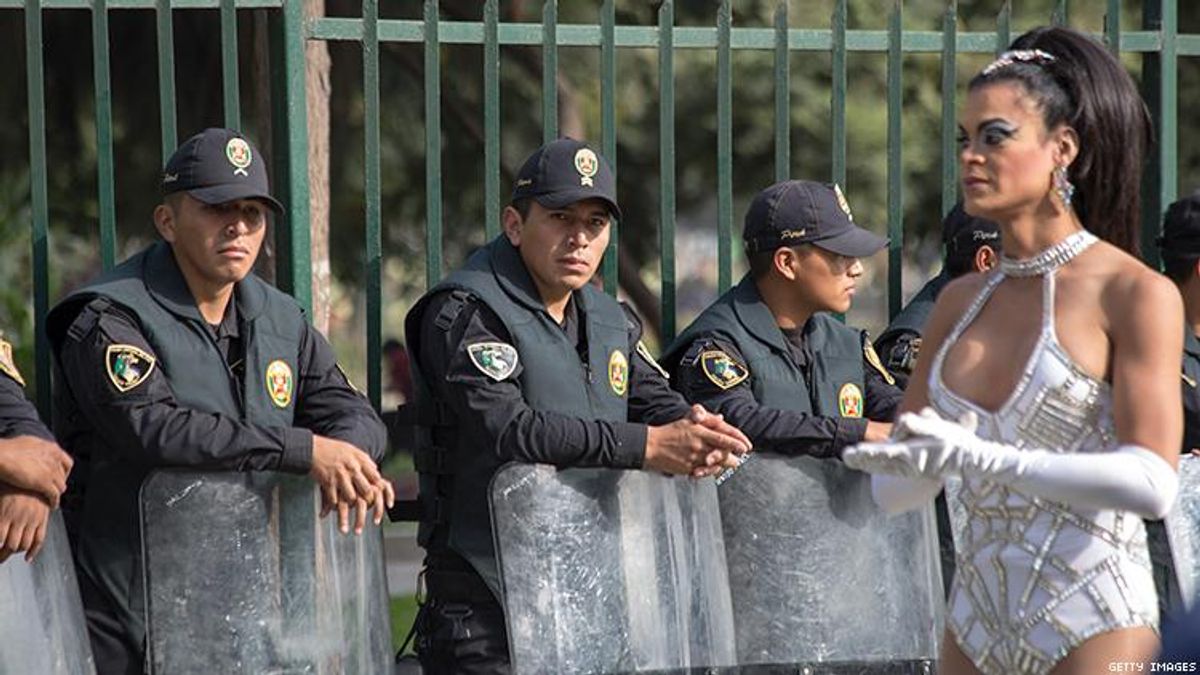Pride
Pride Parades Just Don’t Need Police Officers

50 Radical Ideas: Activist Wriply Bennet on protesting the police at Columbus Pride in Ohio, and why LGBTQ+ parades just don’t need the cops
June 10 2019 4:00 AM EST
November 04 2024 9:56 AM EST
By continuing to use our site, you agree to our Private Policy and Terms of Use.

50 Radical Ideas: Activist Wriply Bennet on protesting the police at Columbus Pride in Ohio, and why LGBTQ+ parades just don’t need the cops
There's kind of an unspoken rule in Columbus, Ohio: Black folks don't go to Pride.
I was planning a cookout with other queer Black trans folks as an alternative to the annual event in 2017. While I was shopping for the occasion, an activist friend called and asked to meet at Starbucks. When I arrived, she was with a couple of other activists I know, and they said they wanted to interrupt that year's parade -- they were tired of the white queer community erasing the Black queer community, and they were tired of the police presence.
There were plenty of reasons to join the protest, but the main one was that Pride is not at all a safe place. Trans women get sexually harassed by gay men, and Bible-thumpers shove and assault queer counterprotesters. When you get harassed and fight back, you get in trouble when the police arrive. And a lot of young Black and queer folks had been incarcerated, brutalized, or murdered in our city by those very officers.
The protest was intended to be about the way police fail our communities: Pride springs from Stonewall, an act of resistance against unjust laws and rampant police brutality. Since then, Black and brown communities, as well as queer and trans communities, find themselves both overpoliced and the target of brutality by law enforcement. So, when it came to joining my fellow activists, I said yes.
That year, there were more cops, barricades, and snipers on roofs, because the Pulse nightclub shooting had just happened. We stood near these homophobes waving their signs around, stepping into the street, and we watched as police officers went over and had a whole conversation with them: "Excuse me sir, could you please just step on over here?"
Then, we stretched across the street -- well, we didn't even have enough people to stretch all the way -- and we blocked the parade. After about a minute, there were a million officers shouting, "Move! Get back! You are obstructing!" We tried to stand there, but we started getting shoved back. A friend of mine started screaming, "Black Lives Matter."
That's when a police officer ran up and pepper-sprayed him, dragged him out of the line, slammed him to the ground, and jumped on him.
I let go of the line and tried to get to him, but the police pushed me to the ground. I felt somebody trying to stop me from moving. While I was flat on the pavement, I heard them shouting, "Stop! You're resisting arrest!"
The arresting officer constantly misgendered me and talked about my genitals to everyone in the precinct. He said things like, "He has male genitalia, he thinks he's a girl." I just said, "Oh my God, stop talking about my genitals to every passing person." I was held for hours in a cell that smelled like piss and had boogers on the wall before we were finally bailed out.
What we tried to say that day was quite simple: We should be able to go to Pride without any brutality. I have no trust that cities will do anything to stop relying on law enforcement at parades, but I do have trust in the people, because movements like this have to come from the ground up.
The next year, an organization I was a part of called Black Queer & Intersectional Collective planned a Community Pride; not in protest, but a means to continue giving people an alternative. At the last minute, we learned the security firm we hired had ties to fugitive recovery efforts and Immigration and Customs Enforcement, so we fired them.
We still needed protection, so we got a whole group of people together, got a bunch of walkie-talkies, made contingency plans, and figured out how to protect the people at this event. So many people showed up: children and queer parents, all those Black, queer youth came and felt comfortable. It was protected by members of the community. It was beautiful. It felt right. It was as Pride should be.
-- Wriply Bennet, artist and organizer, as told to Michelle Garcia
This is one of our 50 Radical Ideas, featured in Out's June/July 2019 issue celebrating Stonewall 50. The three covers feature the enduring legacy of activist Sylvia Rivera, the complicated candidacy of presidential candidate Pete Buttigieg, and the triumphant star power of actress Mj Rodriguez. To read more, grab your own copy of the issue on Kindle, Nook, Zinio or (newly) Apple News+ today. Preview more of the issue here and click here to subscribe.